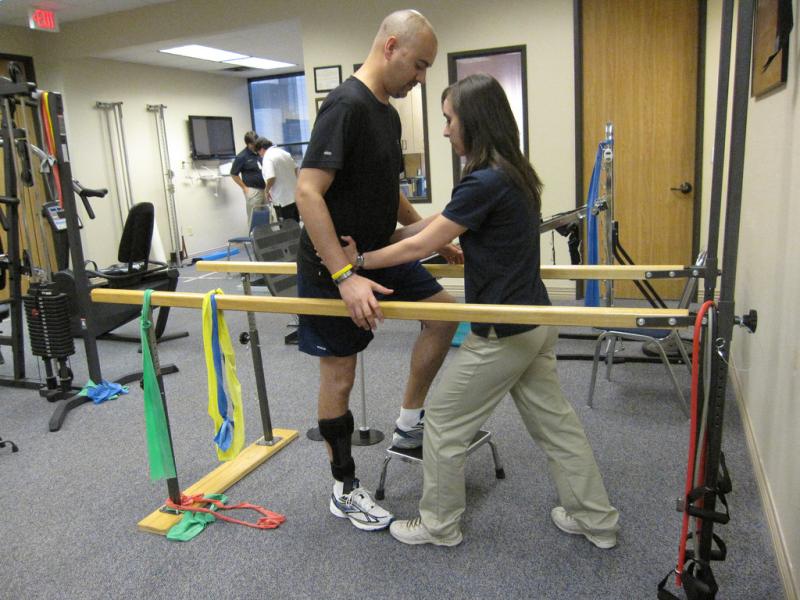Physical Therapist

An education in neuroscience can provide students with an excellent background for a career as a physical therapist. Sample 4-year plans for pre-PT neuroscience majors can be found on our Curriculum page. PT programs have a number of pre-requisites that can vary from school to school. Note that several courses required for neuroscience majors overlap with pre-PT requirements including data analysis, biology, and chemistry.
Requirements for PT school, including pre-requisite coursework, can vary tremendously. It is recommended that those interested in entering a PT program research the requirements for every school to which they are considering applying. The following list of courses are commonly required:
- Psychology 1100, 2300 and 3340
- Biology 1113 and 1114
- Chemistry 1210 and 1220
- Physics 1200 and 1201
- Psychology 2220, Statistics 2450 or 2480, or Molecular Genetics 5650
- Anatomy 2300 or 3300
- Physiology 3200
- Education: Physical Activity and Education Services 5500 (Exercise Physiology)
There are many things that you can do besides academics that will make you an excellent candidate for PT school:
- Quality volunteer experience is crucial! Professional programs want to see that you are well-prepared for your intended career. These experiences should demonstrate:
- An ability to work with a variety of people
- Leadership
- Philanthropy
- Commitment
- Experience with direct patient care
- Clinician shadowing
- Extracurricular activities
- Personal letters of recommendation from faculty and/or professionals who know you well and can vouch for your strength of character and academic potential. Get to know potential letter writers early by standing out in class, attending office hours, and communicating regularly.
- Strong essays that demonstrate your individuality and indicate a passion for the profession.
- Research experience is strongly encouraged.
What does my GPA need to be?
It depends on the program; their website should have admissions statistics. That being said, anything less than a 3.0, particularly in pre-requisite classes, will make it difficult to find a school that will seriously consider your application.
What do my test scores need to be?
It depends on the program; their website should have admissions statistics. Most PT schools just require the GRE.
What classes count toward my science GPA?
Some programs ask for you to calculate your science GPA. Of course, general science courses like chemistry, physics, and biology are included in this as are most of your neuroscience classes. However, be sure to contact individual programs to confirm eligibility.
When should I take the GRE?
The GRE should be completed at least 6 weeks before you apply.
What is the GRE like?
The GRE tests your verbal, quantitative and analytical writing abilities. See the ETS site for more information.
How do I shadow a PT? Is there some kind of program for which I can register?
Unfortunately, OSU does not have any set program for clinician shadowing. It is up to you to find a willing clinician. You can do so by contacting your own healthcare provider (such as your primary care physician) or a local clinic or hospital. It may be easier to find someone if you are already a volunteer at their place of work. See the AAMC guide for more information.
What do you mean by 'quality' volunteer experience?
Quality volunteer experience puts you into direct, personal contact with a variety of people. Not all of your volunteer experience needs to be strictly medical- for example, working at a homeless shelter where you interact daily with disadvantaged individuals would be far more valuable of an experience than directing visitors to different hospital departments.
How many direct patient care/shadowing hours do I need?
PT programs generally do not have a specific number of patient care hours but they often prefer that applicants have some experience in a healthcare setting observing PTs in a variety of roles. It is recommended that you get at least 8 hours of shadowing each of the following: inpatient, outpatient, geriatric, and pediatric.
What kinds of extracurricular activities are best?
Anything that you are passionate about! Professional schools are interested in recruiting a diverse group of people with a variety of interests.
I'm not sure if neuroscience is the right major for me. Would it look bad if I majored in [any major]?
No. Professional schools generally do not care what your undergraduate major is. OSU Medical School's entering class of 2014 included students majoring in neuroscience, finance, theology, and history.
Which specialization is best for pre-PT?
It doesn't matter which specialization you choose- just pick the one that you like the best and that will inspire you to do well.
Would it look bad if I took time off?
Absolutely not! Many professional schools look favorably on older applicants because they are generally more mature and have more extensive life and work experience. Furthermore, since PT programs prefer applicants with patient care experience, it may be best to take at least a year off in order to accumulate an adequate number of hours.
I don't think I want to pursue a career in healthcare anymore. What else can I do?
Majoring in neuroscience provides you with broad scientific literacy that will prepare you for a variety of careers. Visit our Careers page for a list of other options.

